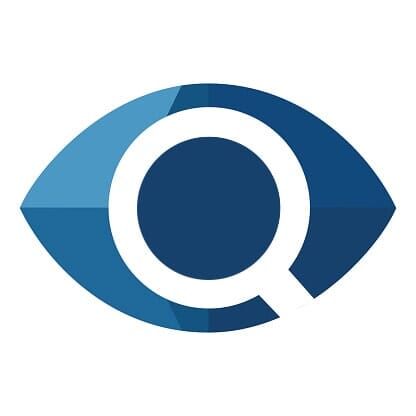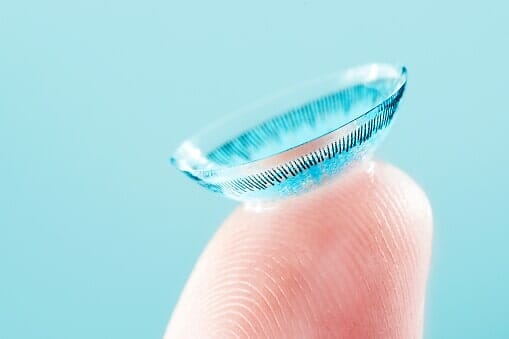Contact Lenses in Colorado Springs, CO

Contact lens evaluations, fittings, and insertion and removal trainings are separate services with charges that are not included in a comprehensive exam.
Why is a Contact Lens Fitting Necessary?
Contact lens fittings
are necessary because contact lenses have the potential to damage a patient's eyes. Contacts are regulated by the FDA (Food and Drug Administration) and are classified as Class II medical devices - devices that have potential to harm a patient and require guidelines for their use and distribution. Contact lenses are prescription devices that fit into your eye and have the potential of leading to vision threatening complications if used incorrectly. Without a valid contact lens prescription, it is illegal for a patient to be sold contacts. If a patient buys contacts from an organization not associated with the patient's eye doctor, that organization is required to verify that the patient's prescription is accurate. Our office and most vision clinics prescribe prescriptions that last for 12 months.
Without a valid and current contact lens prescription, patients will not be able to purchase contacts from our offices or from an outside distributor. This is due to FDA regulations.
Even if a patient's prescription has not changed, there will still be a fee for renewing the patient's contact lens prescription. The optometrist (eye doctor) is still performing health checks and measurements of the patient's eyes that are beyond what is included in a comprehensive exam, and is devoting extra time and thought to verify that the patient's contact lens prescription will be suitable and effective. Dr. Roark and Dr. Mayhew are very successful and knowledgeable with their contact lens prescriptions. Our eye doctors often arrive at the perfect prescription for a patient quickly, or quickly determine that last year's prescription will work again for the patient this year. Sometimes when this is the case, the doctor will grant a discount off of our usual fees, but it is not something they are required to offer. The fees for contact lens fittings also include any necessary contact lens follow-up appointments three months of the contact lens fitting. This means if a patient has a problem with their contacts within three months of getting that prescription there will be no charge for them to see the doctor regarding their contacts. These fees also include trial contacts, and include as many trials as it takes to get the contact prescription right.
Contact lens evaluations or fittings are necessary and have fees even if the prescription does not change. Necessary follow-up appointments within three months are covered by these fees.
Pricing For Contact Lens Services
Standard Pricing:
Standard Spherical Fit
$90
$90
Toric/RGP Fit
$110
$110
Multifocal Fit
$120
$120
Monovision Upgrade*
$40
$40
Keratoconus Fitting
$280
$280
Insertion and Removal Training
$20
$20
*The monovision upgrade is charged in addition to the spherical or toric fit for monovision patients.

There are a variety of different contact brands and types of contacts that are suitable for different patients and correct for different problems in the patient's vision. The fitting fees for these different types of contacts vary because different eye problems have varying degrees of complexity and require different amounts of the doctor's time and energy.
Discounted Pricing
We have posted our full prices for our fittings here on our website, but there many different situations in which we can discount these services. We are never obligated to discount our services but sometimes our doctors are happy to. Our optometrists often discount the price if a new patient brings their old boxes of contacts or a copy of their previous contact lens prescription. Sometimes our optometrists will also discount the contact lens fitting if the patient's prescription has not changed.
We have posted our full prices for our fittings here on our website, but there many different situations in which we can discount these services. We are never obligated to discount our services but sometimes our doctors are happy to. Our optometrists often discount the price if a new patient brings their old boxes of contacts or a copy of their previous contact lens prescription. Sometimes our optometrists will also discount the contact lens fitting if the patient's prescription has not changed.
Contact Lens No Charge Follow-ups
We do not charge for contact lens follow-up appointments. If a patient has recently received a contact lens fit from us and isn't happy with their contact lenses they can schedule a no charge contact lens check appointment.
Contact lenses fit differently on different patient's eyes. There are lenses and brands that are comfortable for most patients but feel uncomfortable for other patients. Vision correction can also work differently from patient to patient. In particular, monovision and toric contact lenses can be complicated to fit. For this reason, follow-up appointments can be necessary to make sure a contact lens is working well for a patient. If the doctor who does your contact lens fitting wants to see how the contacts are doing for you after you have some time to try them, we may schedule a follow-up appointment with you at your contact lens fitting. If you do not come to your follow-up appointment, the optometrist may not be able to authorize your prescription. Without an authorized prescription you will not be able to buy contacts from us or from outside vendors. If the doctor schedules a follow-up appointment for you make sure to come to it or reschedule it.
Even if the doctor doesn't request a follow-up contact lens appointment you can schedule one if you feel that the contacts we recently prescribed aren't working well for you. Contact lens follow-up appointments do not have an additional charge. If your contact lens appointment was less than three months you should be eligible for a contact lens check without an additional fee.
Often, depending on the patient and the situation, we can do no charge contact lens check appointments for contact lens fits for six months. If you are having a problem with contact lenses prescribed by one of our optometrists just give us a call and we will do our best to help you!
We do not charge for contact lens follow-up appointments. If a patient has recently received a contact lens fit from us and isn't happy with their contact lenses they can schedule a no charge contact lens check appointment.
Contact lenses fit differently on different patient's eyes. There are lenses and brands that are comfortable for most patients but feel uncomfortable for other patients. Vision correction can also work differently from patient to patient. In particular, monovision and toric contact lenses can be complicated to fit. For this reason, follow-up appointments can be necessary to make sure a contact lens is working well for a patient. If the doctor who does your contact lens fitting wants to see how the contacts are doing for you after you have some time to try them, we may schedule a follow-up appointment with you at your contact lens fitting. If you do not come to your follow-up appointment, the optometrist may not be able to authorize your prescription. Without an authorized prescription you will not be able to buy contacts from us or from outside vendors. If the doctor schedules a follow-up appointment for you make sure to come to it or reschedule it.
Even if the doctor doesn't request a follow-up contact lens appointment you can schedule one if you feel that the contacts we recently prescribed aren't working well for you. Contact lens follow-up appointments do not have an additional charge. If your contact lens appointment was less than three months you should be eligible for a contact lens check without an additional fee.
Often, depending on the patient and the situation, we can do no charge contact lens check appointments for contact lens fits for six months. If you are having a problem with contact lenses prescribed by one of our optometrists just give us a call and we will do our best to help you!
Contact Lenses For Patients Over 40
Monovision is not for everyone, but many people can adapt to it easily. Once a patient is accustomed to monovision they often don't notice that they are using one eye for distance and one eye for near. Monovision contact lenses can create good vision for both near and far in many patients. Although the powers used in a monovision contact lens prescription are different, the contacts used for monovision are the same as regular soft contact lenses. That means that patients with monovision have a wide range of contacts available, and patients with high prescriptions or astigmatism can still do monovision.
Monovision does have some drawbacks. Sometimes the distraction of having one eye blurred and one eye cleared makes overall vision less clear for the patient. Additionally, as a patient grows older their eyes will continue to lose more of their ability to focus on close objects. Eventually the eye with the prescription for reading will only work at a very specific distance and the patient may have to choose between seeing clearly for reading and seeing their computer screen clearly.
Ask our doctors if monovision contact lenses are right for you! Our doctors are experienced with fitting contact lenses and are happy to take the time to get your prescription right. Monovision prescriptions are more complicated than regular contact lens prescriptions, so they often take some follow-up visits. We provide these follow up visits at no charge! Click here for more information about pricing
Multifocal Contact Lenses
If a patient isn't interested in having one eye for distance and one eye for near, there are multifocal contact lenses that can grant near and far vision in both eyes. Multifocal contact lenses have different prescriptions in different parts of the lens just like bifocal or progressive addition spectacle lenses do. The selection of multifocal contact lenses is not as wide as for regular single vision contacts, but there are still many different brands to try for best comfort and vision.
Distance-Only Contact Lenses
Multifocal contacts and monovision contacts both often involve some compromises in clarity to achieve good distance and near vision. An option available to patients over forty who are most concerned with distance vision is to continue using contact lenses that correct for distance vision and do not help with near vision. Patients with presbyopia who choose to go with distance contacts often will wear reading glasses over their contacts when they need to read, sew, or use a computer. Since the contacts are already correcting the patient's vision, the patient can often use cheap over the counter reading glasses instead of needing to buy prescription reading glasses.
Monovision does have some drawbacks. Sometimes the distraction of having one eye blurred and one eye cleared makes overall vision less clear for the patient. Additionally, as a patient grows older their eyes will continue to lose more of their ability to focus on close objects. Eventually the eye with the prescription for reading will only work at a very specific distance and the patient may have to choose between seeing clearly for reading and seeing their computer screen clearly.
Ask our doctors if monovision contact lenses are right for you! Our doctors are experienced with fitting contact lenses and are happy to take the time to get your prescription right. Monovision prescriptions are more complicated than regular contact lens prescriptions, so they often take some follow-up visits. We provide these follow up visits at no charge! Click here for more information about pricing
Multifocal Contact Lenses
If a patient isn't interested in having one eye for distance and one eye for near, there are multifocal contact lenses that can grant near and far vision in both eyes. Multifocal contact lenses have different prescriptions in different parts of the lens just like bifocal or progressive addition spectacle lenses do. The selection of multifocal contact lenses is not as wide as for regular single vision contacts, but there are still many different brands to try for best comfort and vision.
Distance-Only Contact Lenses
Multifocal contacts and monovision contacts both often involve some compromises in clarity to achieve good distance and near vision. An option available to patients over forty who are most concerned with distance vision is to continue using contact lenses that correct for distance vision and do not help with near vision. Patients with presbyopia who choose to go with distance contacts often will wear reading glasses over their contacts when they need to read, sew, or use a computer. Since the contacts are already correcting the patient's vision, the patient can often use cheap over the counter reading glasses instead of needing to buy prescription reading glasses.
New Contact Lens Wearers
Insertion and Removal Training
In the insertion and removal training after the exam, one of our opticians or optometric technicians will sit down with the patient and teach them how to use contact lenses. This includes training on how to insert, remove, clean, store, and care for the contacts. If a patient demonstrates proficiency in both putting in and taking out the contacts, they can leave with those contacts. The doctor will usually check both the vision and the fit of the trial contacts before the patient leaves with them. For first time patients we will almost always schedule a contact lens check for one to two weeks later so that the doctor can make sure the contact lenses are healthy and comfortable for the patient and are accurately correcting the patient's vision. The fee for this service is $20, but sometimes this fee can be discounted. In years after the patient's first contact lens fitting the insertion and removal training will not be necessary. Click here for more information about pricing.
If a patient is struggling with the process of putting contacts in or taking them out, then we can continue the training on a different day. Some patients struggle with learning how to use contacts but we are happy to keep working with a patient over multiple days if necessary. There is no additional charge to continue the training on a different day. It can help to come back on a different day since attempting to insert contacts can irritate the patient's eyes and cause temporary irritation or watering. Once a patient figures out how to use contact lenses they usually improve quickly and are using them without difficulty in a matter of weeks even if they were struggling at first.
Young Patients
Parents frequently ask: “How old does my child need to be before they can start wearing contacts?” Our answer is often 12-13 years old, but it can be very different from child to child. Contacts are an extra responsibility, and patients who wear them need to be prepared for that responsibility. A teenager not caring for their contact lenses properly will likely need to replace their contact lenses more frequently and may be more prone to eye infections. Wearing contact lenses often adds time to morning and evening routines. If a child is not consistent with brushing their teeth and keeping their room clean, they may not be ready for contacts. Feel free to discuss with your child what they need to do to convince you that they are ready for contacts
In the insertion and removal training after the exam, one of our opticians or optometric technicians will sit down with the patient and teach them how to use contact lenses. This includes training on how to insert, remove, clean, store, and care for the contacts. If a patient demonstrates proficiency in both putting in and taking out the contacts, they can leave with those contacts. The doctor will usually check both the vision and the fit of the trial contacts before the patient leaves with them. For first time patients we will almost always schedule a contact lens check for one to two weeks later so that the doctor can make sure the contact lenses are healthy and comfortable for the patient and are accurately correcting the patient's vision. The fee for this service is $20, but sometimes this fee can be discounted. In years after the patient's first contact lens fitting the insertion and removal training will not be necessary. Click here for more information about pricing.
If a patient is struggling with the process of putting contacts in or taking them out, then we can continue the training on a different day. Some patients struggle with learning how to use contacts but we are happy to keep working with a patient over multiple days if necessary. There is no additional charge to continue the training on a different day. It can help to come back on a different day since attempting to insert contacts can irritate the patient's eyes and cause temporary irritation or watering. Once a patient figures out how to use contact lenses they usually improve quickly and are using them without difficulty in a matter of weeks even if they were struggling at first.
Young Patients
Parents frequently ask: “How old does my child need to be before they can start wearing contacts?” Our answer is often 12-13 years old, but it can be very different from child to child. Contacts are an extra responsibility, and patients who wear them need to be prepared for that responsibility. A teenager not caring for their contact lenses properly will likely need to replace their contact lenses more frequently and may be more prone to eye infections. Wearing contact lenses often adds time to morning and evening routines. If a child is not consistent with brushing their teeth and keeping their room clean, they may not be ready for contacts. Feel free to discuss with your child what they need to do to convince you that they are ready for contacts
Colored Contact Lenses
Colored contacts are not widely available for patients with astigmatism. Colored daily lenses are available from some manufacturers. Ask your optometrist about colored contacts at your contact lens fitting if you would like to know more.
Colored Trials
Our office has colored contact lens trials available, but the trials will not have prescription in them. The manufacturers producing prescription colored contact lenses choose to distribute trials that are available in different colors but without prescription in them. There are many different colors to choose from and it would be difficult to stock contacts in different prescriptions for all those colors.
When you are trying colored contacts, we can provide trials of a contact similar to colored lenses but without the color. We can use these clear trials to check how your vision and comfort will be with the colored contacts. Patients can also try out different colors and see how the contacts will look in their eyes. Once we have the color and the prescription figured out, patients can order boxes of their prescription colored contacts
Request An Appointment
Our office has colored contact lens trials available, but the trials will not have prescription in them. The manufacturers producing prescription colored contact lenses choose to distribute trials that are available in different colors but without prescription in them. There are many different colors to choose from and it would be difficult to stock contacts in different prescriptions for all those colors.
When you are trying colored contacts, we can provide trials of a contact similar to colored lenses but without the color. We can use these clear trials to check how your vision and comfort will be with the colored contacts. Patients can also try out different colors and see how the contacts will look in their eyes. Once we have the color and the prescription figured out, patients can order boxes of their prescription colored contacts













